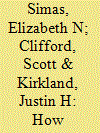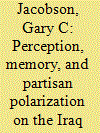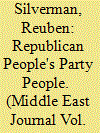|
|
|
Sort Order |
|
|
|
Items / Page
|
|
|
|
|
|
|
| Srl | Item |
| 1 |
ID:
165863


|
|
|
|
|
| Summary/Abstract |
It is commonplace to equate the arrival of a new conservative administration in Washington, DC, with the “rolling back” of the federal activities. We disagree with this conventional perspective, and seek to demonstrate that the equation of conservative Republicanism and retrenchment elides a critical change in the relationship between party politics and State power—a relationship that Donald Trump seems determined to nurture. Drawing on primary research, we argue that partisanship in the United States is no longer a struggle over the size of the State; rather it is a contest to control national administrative power. Since the late 1960s, conservative administrations have sought to redeploy rather than dismantle or roll back state power. Through “redeployment,” conservative presidents have sustained previous levels of State spending or State activity, but in a way reflecting a new administration’s ideology.
|
|
|
|
|
|
|
|
|
|
|
|
|
|
|
|
| 2 |
ID:
171346


|
|
|
|
|
| Summary/Abstract |
Over the past two decades, there has been a marked increase in partisan social polarization, leaving scholars in search of solutions to partisan conflict. The psychology of intergroup relations identifies empathy as one of the key mechanisms that reduces intergroup conflict, and some have suggested that a lack of empathy has contributed to partisan polarization. Yet, empathy may not always live up to this promise. We argue that, in practice, the experience of empathy is biased toward one’s ingroup and can actually exacerbate political polarization. First, using a large, national sample, we demonstrate that higher levels of dispositional empathic concern are associated with higher levels of affective polarization. Second, using an experimental design, we show that individuals high in empathic concern show greater partisan bias in evaluating contentious political events. Taken together, our results suggest that, contrary to popular views, higher levels of dispositional empathy actually facilitate partisan polarization.
|
|
|
|
|
|
|
|
|
|
|
|
|
|
|
|
| 3 |
ID:
172888


|
|
|
|
|
| Summary/Abstract |
I offer a new perspective on the history of American democratization, tracing the evolution of conflict over black suffrage from the disenfranchisements of the early Republic to efforts to secure equal voting rights in the pre-Civil War era. I draw on case studies and new data on state politics to substantially expand our descriptive understanding of the ideological connotations of African American political rights. In contrast to existing literature, this study identifies a transformation in how positions on black suffrage polarized along party lines. It also offers a new interpretation for this racial realignment, presenting evidence that legislators responded less to the electoral consequences of black voting than to efforts of party leaders and social movements to frame its denial as necessary for national unity, a pragmatic accommodation to racist public opinion, or as complicity in slavery and a violation of republicanism. Integrating earlier periods of disenfranchisement and antislavery activism recasts standard party-driven accounts of Reconstruction-era enfranchisements as the culmination of a long process of biracial social movement organizing, enriching our understanding of how both electoral and programmatic concerns contribute to suffrage reforms and of the process by which conflict over citizenship has at times become a central cleavage in American politics.
|
|
|
|
|
|
|
|
|
|
|
|
|
|
|
|
| 4 |
ID:
096157


|
|
|
|
|
| Publication |
2010.
|
| Summary/Abstract |
Analyzes four surveys designed to investigate partisan polarization on the Iraq war. He finds that modes of motivated reasoning, including motivated skepticism and selective perception, selective memory, and selective exposure, contributed strongly to the emergence of the unusually wide differences of opinion on the war.
|
|
|
|
|
|
|
|
|
|
|
|
|
|
|
|
| 5 |
ID:
165786


|
|
|
|
|
| Summary/Abstract |
Though it was the Democrat Party that governed Turkey from 1950 to 1960, and whose successes and excesses shaped the conditions of democratization, the previously ruling Republican People's Party played a crucial role as well. Drawing on newspapers, memoirs, and parliamentary debates, this article considers how the party's leaders and its young cohort of future leaders reacted to defeat, redefined themselves as members of the opposition, and contributed to a polarized political culture that persists today.
|
|
|
|
|
|
|
|
|
|
|
|
|
|
|
|
|
|
|
|
|